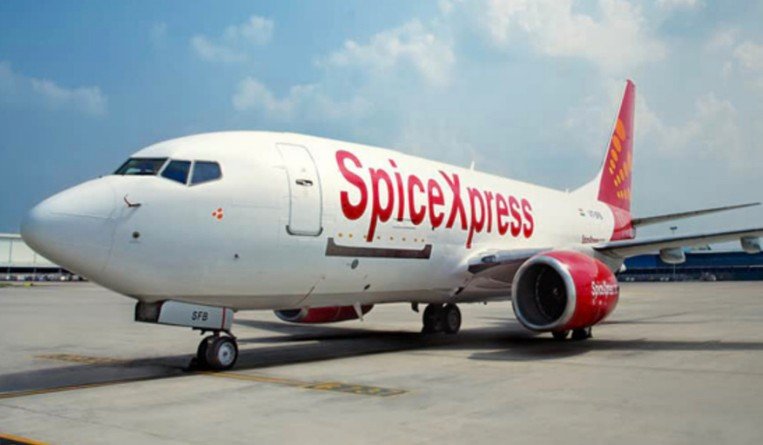An interline agreement between India’s SpiceJet and Kenya’s Astral Aviation signals both new directions in the air cargo industry as well as underlining opportunities few Asian carriers have yet to tap.
Under the agreement, SpiceXpress, the cargo unit of Gurugram-based SpiceJet, will increase its access to Africa by sending shipments to Dar es Salaam; Entebbe; Juba, South Sudan; Mwanza, Tanzania; Mogadishu; Pemba, Mozambique; Zanzibar; Nairobi; Johannesburg; Hargeisa, Somalia; and Lusaka, Zambia.
SpiceJet in August announced plans to hive off its cargo operations into a separate entity on or around October 1; it has already sought permission from its shareholders to do so. Once the operation is completed, the cargo arm of SpiceJet would operate under its subsidiary SpiceXpress and Logistics Pvt. Limited.
Astral Aviation is similarly expanding its network to India, and will now have services to and from Mumbai, Bengaluru, Chennai, Hyderabad and Delhi. These will connect shipments through Sharjah, its hub in the United Arab Emirates, then onwards to Nairobi and the rest of Africa.
“This interline agreement will strengthen the trade lanes between the two continents and provide much faster and seamless logistics solutions. It will help SpiceXpress build its African network and ensure SpiceXpress’ presence in the high growth African continent,” Sanjiv Gupta, chief executive officer of SpiceXpress said.
The agreement opens up a lot of cities for both partners, albeit some with low initial volumes, Sanjeev Gadhia, CEO of Astral Aviation, told Asia Cargo News. However, the real issue is the potential it has down the line.
“We expect that the new interline agreement with Spice Jet will generate at least 500 tons per year into the Astral intra-African network in the first-year alone,” Gadhia told Asia Cargo News.
Headline-grabbing though this appears, it is another step in Astral’s long-term collaborative strategy, which is very much focused on Asia, a region it is keen to expand further in.
In addition to SpiceJet, Astral also has an interline agreement with Air India, which enables Astral to cooperate with two strong airlines to and from India, Gadhia said.
“India is the second largest trading partner of Africa after China, hence we anticipate an increase in volumes between India and Africa as a result of the growing role that India plays in the pharmaceuticals, machinery, spare parts and raw materials, to name a few,” Gadhia added.
Astral actually has some 25 interline agreements, which account for more than 25% of its business, and is looking for more, especially in Asia, and especially in China.
“We are open to interline agreements from bona fide carriers which will have bilateral opportunities for both carriers. Currently we are seeking interline agreements with airlines from Asia, which is a region which has many opportunities,” said Gadhia.
“China is the largest trading partner of Africa but sadly there is only China Southern, which flies to only one destination in Africa,” he said “Chinese airlines have not tapped the opportunity of flying to Africa despite having strong trade-ties. We have an interline agreement with China Southern and are looking at expanding our interlines in China in the short and medium term, whereas the long-term plan is to fly to China and also have a representative office in Guangzhou,” he added.
Astral are planning to open additional hubs in Johannesburg and Lome this year, with the company also talking about a new hub in Guangzhou beyond that to complement its Liege and Sharjah hubs.
Besides interline agreements, the big innovation Astral is pushing is the use of drones.
It has done a number of successful pilot projects of cargo delivery drones in Europe with FlyOx and has also entered into co-operation with Drone Delivery Canada and Wingcopter.
It is also in the final stages of regulatory approval in Kenya, which will enable the company to offer similar solutions to clients in East Africa, including doing part of the moving of the Covid-19 vaccine.
“We are working on a pilot-project in Kenya which involves the delivery of the Covid vaccine using a drone to various locations in Kenya,” Gadhia told Asia Cargo News without elaboration.
One other strong similarity between the two carriers is that both are adding designated freighters to their fleets.
Astral deployed its recently acquired Boeing 767-200F on the Nairobi-Sharjah route, with effect from February 3, 2021, offering capacity for 80 tonnes per week of flowers and vegetables to the United Arab Emirates. Gadhai pointed out the newly-acquired freighter complements the existing fleet by providing new opportunities in the 40-tonnes category, previously underserved in Africa.
The freighter will also offer capacity for the distribution of the Covid-19 vaccine to and within Africa in addition to humanitarian cargo.
Astral’s fleet includes a Fokker F27 freighter with a 5-ton capacity, a McDonald Douglas DC-9 freighter with a 15-ton capacity, a 727 freighter with a 24-ton capacity, a 767 freighter with a 40-ton capacity within its intra-African network and a wet-leased 747-400F on the Nairobi-London and Liege sector.
SpiceJet has inducted two more wide-body planes – a 767 and an Airbus A330 – to its cargo fleet, giving it a dedicated cargo fleet of nineteen aircraft. This includes five wide-body jets.
The two new aircraft primarily will be used for transporting cargo goods, medical and essential supplies on long-haul routes including to destinations in Europe and North America. SpiceXpress, the airline’s cargo arm, aims to further strengthen its cargo fleet while providing a seamless and secure transportation of Covid-19 vaccine.
Michael Mackey



